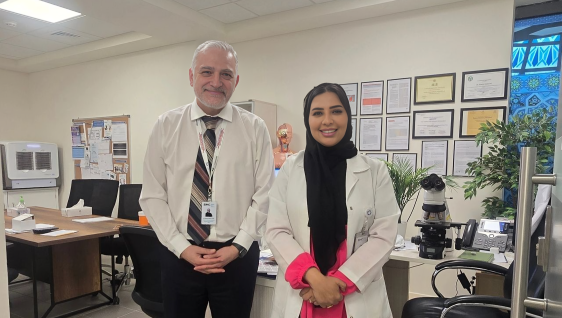
Rawia Mohamed: Reflex molecular testing in cases of cholangiocarcinoma
Rawia Mohamed, Head of the Anatomical Pathology Department at Burjeel Medical City and an Associate Professor at Khalifa University, shared a post on LinkedIn:
“It is always a pleasure to have our clinical colleagues stepping in the pathologist office discussing enquiries or discussing about new testing requirements for their treatment protocols.
Today I was pleased to discuss with the director of Burjeel Cancer Institute | BCI some updates regarding reflex molecular testing in cases of cholangiocarcinoma.
The discussion outlines reflex molecular testing for newly diagnosed cholangiocarcinoma patients.
1. NGS DNA Sequencing for EGFR, IDH1/2, and BRAF V600 Mutations:
EGFR Mutations: These are less commonly implicated in cholangiocarcinoma compared to lung cancer, but testing can identify actionable mutations in rare cases.
IDH1/2 Mutations: These mutations are more frequently seen in intrahepatic cholangiocarcinomas and are relevant for targeted therapies like IDH inhibitors (e.g., ivosidenib).
BRAF V600 Mutations: Though not common, this mutation is important because patients with this mutation may benefit from therapies like dabrafenib and trametinib.
2. RNA Sequencing for FGFR and NTRK Fusions:
FGFR Fusions: FGFR2 fusions are particularly relevant in intrahepatic cholangiocarcinomas, and targeted therapies like FGFR inhibitors (e.g., pemigatinib, infigratinib) can be highly effective for these patients.
NTRK Fusions: Rare but actionable across tumor types, including cholangiocarcinoma, with therapies such as larotrectinib and entrectinib available.
My Overall Comments regarding these tests:
Relevance: This panel includes some of the most clinically significant mutations and fusions relevant to cholangiocarcinoma. It enables identification of actionable targets and personalized treatment strategies.
Scope: Adding reflex molecular testing ensures that every newly diagnosed case is evaluated comprehensively without requiring additional requests, which saves time in initiating targeted therapies.
Testing Modality: The use of both DNA and RNA sequencing improves detection sensitivity for these mutations and fusions, which may not be captured comprehensively using a single modality.
This approach aligns with precision oncology practices and ensures optimal patient care by incorporating advanced molecular diagnostics.”
Rawia Mohamed is the Head of the Anatomical Pathology Department at Burjeel Medical City and an Associate Professor at Khalifa University. She previously worked as a consultant at Sheikh Shakhbout Medical City.
-
ESMO 2024 Congress
September 13-17, 2024
-
ASCO Annual Meeting
May 30 - June 4, 2024
-
Yvonne Award 2024
May 31, 2024
-
OncoThon 2024, Online
Feb. 15, 2024
-
Global Summit on War & Cancer 2023, Online
Dec. 14-16, 2023
